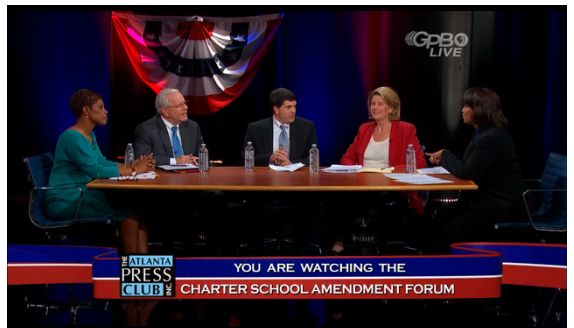Headline News: Unleashing Charter Schools with False Claims & Lots of Money
Just as the re-election of President Obama or the election Mr. Romney is coming to a head, so is the potential of charter schools being unleashed in several states around the nation. Georgia and Washington State have very similar laws on the November ballot, and if you live in either of these states, you know that the issue is before you.
I have reported on this blog that the Georgia bill was a model bill written by the American Legislative Exchange Council (ALEC), a right leaning partisan group. The Georgia bill is ghostwritten copy of the ALEC model charter bill. And we have reported that the legislators in Georgia who introduced and back the charter amendment are also ALEC members.
To get an idea of extent of the charter school issue across the country, here are some headlines that were extracted from the web recently. Themes that run through these headlines are central charter authority, for-profit charter management companies, billionaires influencing legislation, lack of facts about charter schools compared to public schools.
- School charter authority debated in Sunday broadcast (Georgia)
- Charter school companies, online learning outfits try to wield influence in Tallahassee (Florida)
- Op-ed: Approve Initiative 1240 to allow public charter schools (Washington State)
- The billionaire boys (and girl) club for charter schools (Arkansas)
- Charter school fight in Washington has parallels to Georgia
- Microsoft gives $50,000 more to Washington charter school initiative
- Guest column: Charter schools amendment is cash cow
- Charter School Lobby Group Quits ALEC Two Days After Being Identified By Republic Report
- Who Will Benefit From State-Run Charter Schools? Students or Shareholders?
The Big Charter School Debate
This weekend, the Georgia Public Broadcasting and the Atlanta Press Club co-sponsored a debate among four panelists. On the pro-amendment side were Jan Jones (state representative), Kelly McCutchen, founder of Tech High Charter School. Opposing the amendment were Alvin Wilbanks, Superintendent of Gwinnett County Public Schools (Georgia’s largest district), and Valarie Wilson, president of the Georgia School Board Association.
This is a link to video of the one-hour debate.
Moderating was Donna Lowry, WXIA-TV, and Maureen Downey, education reporter, Atlanta Journal-Constitution.
Seventeen people were in attendance at the televised debate.
Jan Jones’ name has come up on this blog before. It turns out that Representative Jones was one of three reps that introduced the amendment to change the Georgia Constitution that would put back in place the Georgia Charter School Commission that would have the power to create its own stream of schools, even without local school district approval. The more important fact here is that Rep. Jones is a member of ALEC, and one can assume that she used the ALEC model bill to “write” the Georgia bill.
Arguments for the Amendment
Jones argued that we need the bill because some local districts are turning down charter applications. She claims this means that parents will have no other place to send their kids if the local schools are failing. She also uses this very powerful statistic: Because Georgia ranks 47 out of 50 in graduation rates, Jones feels that if more students were enrolled in charter schools Georgia students might move up in the league standings. Her comments were rife with political-speak, and it was clear she was shielding us from her ties to ALEC. She was evasive about the content of bill when pressed on whether the bill includes the provision for a state appointed charter commission. It does. She said it didn’t, and she wrote the bill. I think she is wrong and is not telling the truth.
Kelly McCutchen, founder of a charter school, and president of the Georgia Public Policy Foundation ( a conservative group), argued for charter schools because around the state there are some dysfunctional school boards, and by having a state appointed charter commission, parents in these districts could have a “choice” if charters were formed in their dysfunctional district. McCutchen, whose interests are in having the state expand charters, pulls the “parent choice card” when ever he can in the debate. To him the best option is to give parents a choice of schooling options,,even though parents already have choices. He also claims there is plenty of money, and that’s a good thing. Too bad his facts are wrong.
Arguments Against
Both speakers at the outset said they were not against charter schools, per se. However…
Alvin Wilbanks, Superintendent of Gwinnett County Public Schools was vehement in his opposition to removing the power to create schools away from local boards of education. He also argued that this was another expansion of government, and it would result in two separate school “systems,” one at the local level, and the other at the state level. It would be costly not to the state, but to local districts who would be fiscally responsible.
He also argued that the language that voters will see on the ballot is misleading. The question on the ballot is Shall the Constitution of Georgia be amended to allow state or local approval of public charter schools upon the request of local communities?. Local schools already are allowed to create charters. And the Georgia Department of Education has the right to approve charters as well. What this bill really is doing is reinstating the Georgia Charter School Commission, an appointed board with the power to approve its own set of charters.
Valarie Wilson, president of the Georgia School Board Association, a school board member of the Decatur City Schools argued that this bill will cost the state and local districts money. Wilson also challenged Rep. Jones on the issue of funding, and made it clear that over the past five years, Georgia schools have received fewer funds, not more, and indeed, many school districts are operating in a deficit.
Wilson also challenged McCutcheon claims that some school boards are dysfunctional, and that some schools are failing. Wilson referenced data from NAEP that shows Georgia schools showing a steady increase in achievement. She also pointed out that Georgia students rank 13th in AP scores. As Wilson infers, Georgia schools have shown a steady improvement over many years, and references the NAEP scores in mathematics and science, which we have reported here.
Arguments Left Out of the Debate
The charter ballot issue is about money and power. The panelists did talk about money, but not the money that private for-profit charters would make if the amendment passes. The power to set up charters will be in the hands of an unaccountable charter commission appointed by the Governor, Lieutenant Governor and the Speaker of the House. Most of the money to support passage of the amendment has come from out-of-state from power groups, and billionaires, and the appointees will be political appointees. These two issues were not discussed by the panel.
Another argument left out of the debate is what role did ALEC play in the amendment. Although we know the answer, it was not part of the actual debate. During the panel’s debate, Maureen Downey was interacting via the Internet with viewers, and one question asked was this one from Jeff:
Can Jan Jones explain what relationship, if any, ALEC has with this issue. Also, why is so much money from outside of Georgia being spent to push for this amendment?
Unfortunately the influence of ALEC was not discussed, nor was it mentioned that Rep. Jones is a member of ALEC, and one of the Georgia legislators who introduced the bill.
Also left out of the debate was the effectiveness of charter schools and the unintended consequences of charter schools. It should have been mentioned that charter schools are not so hot when compared to public schools. An interesting graphic that could have been used in the debate is one from Dr. Michael Marder’s research which shows the relationship between SAT scores and poverty comparing charters and regular public schools. Representative like Jan Jones continue to ignore data that show that public schools are by far much more successful, academically and in many other areas of school life.

Figure 1. This graph might be disappointing to advocates of charter schools. The graph shows the percentage of high school graduates meeting SAT/ACT College Readiness Criterion plotted against the concentration of poverty. Each disc is a high school; the red dots are charter schools, the grey are public schools. In general, charter schools simply to do not compare favorably to public schools, regardless of poverty concentration.
Here some other facts that the proponents of charter schools failed to mention that were based on a study published by the Center for Research on Education Outcomes (CREDO) at Stanford.
- Of the 2403 charter schools investigated, 46 percent of charter schools have math gains that are statistically indistinguishable from the average growth among their TPS comparisons.
- Charters whose math growth exceeded their TPS equivalent growth by a significant amount account for 17 percent of the total.
- The remaining group, 37 percent of charter schools, posted math gains that were significantly below what their students would have seen if they enrolled in local traditional public schools.
They also might have mentioned that the majority of students attending charter schools would have fared better if they are gone to a public school. And in the case of Georgia (one of the 15 states in the study), the results were mixed, or no differences were found between the charter schools in Georgia and the public schools.
False Claims
If you listen to the politician and the owner of a charter school, public schools do not know how to meet the divergent needs of Georgia students. As one of them said, “one size does not fit all.” Professional educators know this instinctively. Furthermore, teachers in public schools (and independent schools, by the way) have worked with researchers who are on the cutting edge of the learning sciences. This two-way interaction between teachers who have experiential knowledge of the classroom and students, and researchers who take themselves out of the ivory tower to work with teachers to seek answers to questions about how students learn.
The supporters of the charter amendment do not have the interests of parents or students in mind. They make the false claim that charters will put schooling back into the hands of parents, when in fact the charter school movement has led to putting taxpayer money in the accounts and hands of charter management companies. Parents and students are being used to secure this end.
The politician and charter owner lost this debate. Who would know? Only 17 people were in attendance.
The vote for the passage of the charter amendment will be very close, as it will be for the re-election of President Obama.
This blog post has been shared by permission from the author.
Readers wishing to comment on the content are encouraged to do so via the link to the original post.
Find the original post here:
The views expressed by the blogger are not necessarily those of NEPC.

